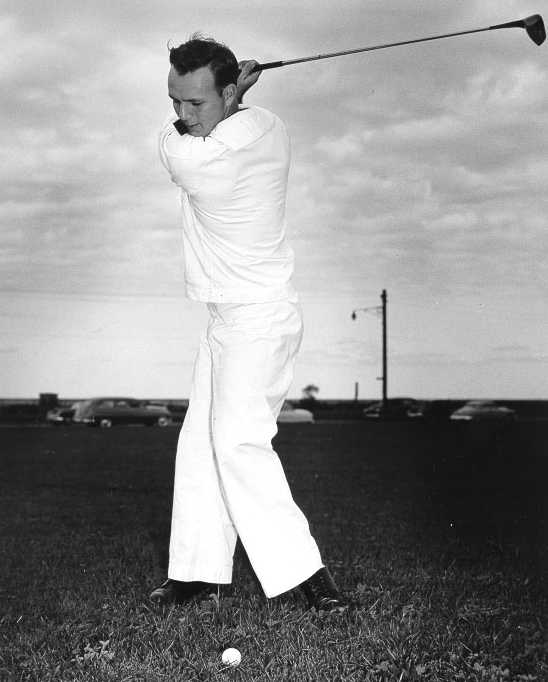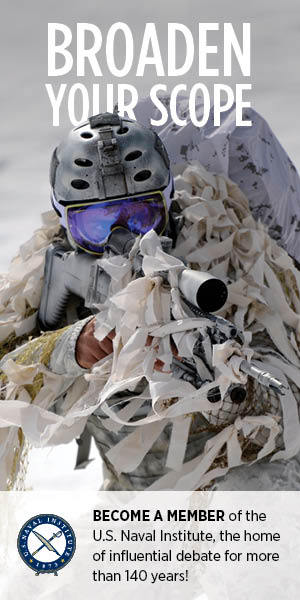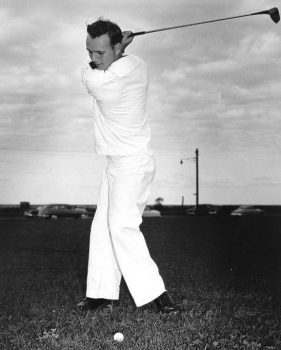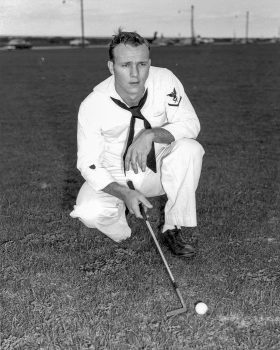
The following appeared under the heading “Answering the Call” in the January 2009 issue of Proceedings. It is based on an interview conducted by Senior Editor Fred Schultz, who pointed out that the two were fellow Pennsylvanians—Palmer from Latrobe and Schultz from Gettysburg. Palmer replied, “One of my best friends lived in Gettysburg. His name was “Ike.”
‘To Mature and Grow into a Man’
Since joining the professional ranks after winning the U.S. Amateur Championship in 1954, he has won 92 national or international golf competitions, 61 of which—including four Masters—have come on the PGA tour. Voted Athlete of the Decade for the 1960s in an Associated Press poll, Arnold Palmer has won every major except the PGA Championship, having finished second in that annual tournament three times. Even though his devoted and extensive tournament fan gallery is known as Arnie’s Army, Palmer recently received the U.S. Navy Memorial’s Lone Sailor Award for his service in the U.S. Coast Guard and subsequent success as a pro golfer. Here’s what he remembers about that service and what it meant to him.
I can’t say it was my destiny to join the Coast Guard. It just happened. When I was in high school, I had a great friend named Bud Worsham. We had become close pals playing the junior golf circuit across the United States. Before we graduated from high school, he asked me one day where I was going to go to college. I told him I hadn’t really thought much about it, and he said, “Why don’t you go to Wake Forest?” I thought that was a great idea.
So we both ended up in North Carolina at Wake Forest and played on its golf team. He and I were there for three years before a tragic event changed everything. In our senior year, Bud was killed in an automobile accident on the way home from our homecoming dance in Durham. Up to that time, that was probably the toughest thing that ever happened to me. We were very, very close. I tried to stick it out and stay in school, but I just couldn’t do it. In fact, I lost it. Consequently, I decided I needed to change the scenery and after finishing the fall semester signed up for three years in the Coast Guard.
There were numerous things I liked about the Coast Guard. First, I enjoyed boating and I liked the water. And in the back of my mind I had worked up an appetite for flight. I thought flying in the Coast Guard would be the greatest thing that could ever happen, other than playing golf, of course. So I reported to Cape May, New Jersey, for boot camp. Physical fitness was pretty much my bag, and I became an instructor. I was also a lifeguard on the ocean beach while I was there and helped train recruits.
I even managed to get involved in golf at boot camp, but not in the way one might expect. The commanding officer one day commissioned me to build a golf course. But he didn’t provide any equipment, which was a major hindrance. We did manage to build a sort of rudimentary, haphazard course, but it was not a pretty sight.
I volunteered at Cape May for something I thought would be interesting but turned out to be an ordeal. I signed up to train for the honor guard at the Washington premiere of the 1951 movie, The Fighting Coast Guard. The training was extensive and it was all on the cold, windy Cape May runways. We were still in boot camp, and it was hard. We had an old Marine drill sergeant as our company commander, and he was one tough character. When I volunteered to do this, I thought it would be a chance for me to get to see some of my friends and my sister, all who lived in Washington. But it almost wasn’t worth it. We trained for 60 days, and it was damned cold. They had started with about 400 men and ended up with 60. I made the final 60, and I’m still pretty proud of that. I never did get to visit with my friends or my sister in Washington.
I was transferred after almost a year at Cape May to Cleveland and to a job with the Coast Guard Auxiliary. My commanding officer was the son of former Commandant of the Coast Guard Admiral Russel Waesche. At that time, and I guess it’s still true today, the Auxiliary in Cleveland trained civilians to help police the boats on the Great Lakes, teaching them how to keep a boat fit for sailing. That was part of my job.
After about six months in Cleveland, I went to Groton, Connecticut, where I enrolled in my first Coast Guard school and became a yeoman. I was assigned to the 9th Coast Guard District, and my job was to travel to all the district’s stations and take identification photos of everyone. This was how Coast Guard personnel received their security clearances. I was in charge of taking the photos, bringing them back, developing them, and organizing them. After this, I had to distribute both IDs and security clearances to all whose pictures I had taken at each station. It was a long, tedious job.
Even though I’ve since taken up flying, I never did get to fly in the Coast Guard. What happened was that the admiral who was my boss suggested that I could be a Coast Guard aviator, but I had to sign up for another three years and go to flight school. I could then go into naval or Coast Guard aviation training. I decided then that I really wanted to play on the PGA tour, and that superseded any notion of flying. When I completed my last semester at Wake Forest after leaving the service, I went back to Cleveland and worked as a manufacturer’s rep just before winning the national Amateur Championship. Shortly after that, I got married and went on tour.
But I’ve never forgotten my Coast Guard service and have retained many things from it. It provided good discipline and opportunities for me to mature and grow into a man. The Coast Guard was very important in helping me understand things I didn’t quite understand when I went in. It gave me the confidence that I was going to be able to do what I needed to do in my life. And it allowed me the opportunity to take a little time to understand myself and the outside world.
A number of my friends have had Coast Guard connections. I played golf quite a bit with the famous pro football player and coach Otto Graham, and he became a very good friend. Otto was a captain in the Coast Guard and the football coach at the Coast Guard Academy. We communicated regularly up until his death. Another person in my life with a Coast Guard connection is the former Governor of Pennsylvania, my friend Tom Ridge. He was the first Secretary of the Department of Homeland Security, which includes the Coast Guard. He is one of the great people in this country.
On a final note, I want to say how important I think it is to serve your country. Too many people in leadership positions today do not know what it means to serve. It’s actually very sad. Every person in the United States of America, all people who are born here, should at some point in their life serve their country for at least one year in some fashion. That should be compulsory. If they’re physically fit, they should serve. Such a requirement would benefit both the nation and the individual.



